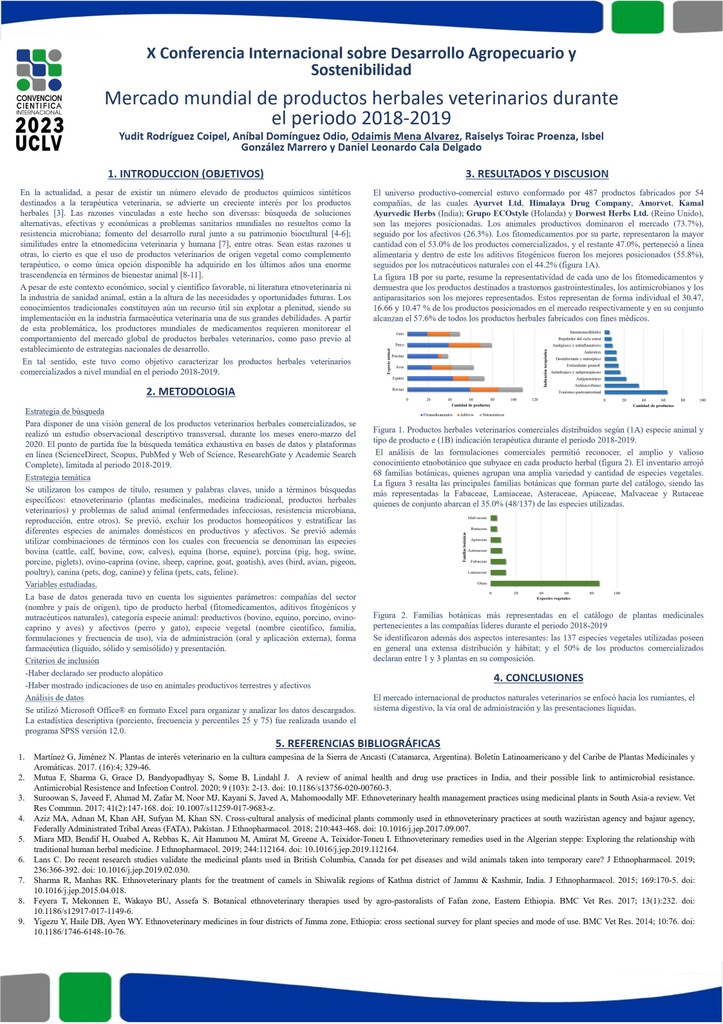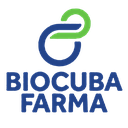Executive Secretary

IX Conferencia Científica Internacional sobre Desarrollo Agropecuario y Sostenibilidad
X Simposio de Medicina Veterinaria y Zootecnia

Resumen
La fabricación industrial de productos naturales veterinarios es una de las grandes debilidades del sector veterinario, a pesar de existir un creciente interés por ellos y ancestrales saberes tradicionales que lo respaldan. Objetivo: caracterizar los productos herbales veterinarios comercializados a nivel mundial en el periodo 2018-2019. Metodología: se realizó un estudio observacional descriptivo transversal para caracterizar los productos herbales veterinarios comercializados a nivel mundial en el periodo 2018-2019. Se efectuó una búsqueda temática exhaustiva en bases de datos (ScienceDirect, Scopus, PubMed y Web of Science, ResearchGate y Academic Search Complete), limitada al periodo 2018-2019. Resultados: el estudio encontró 487 productos registrados en el mercado mundial, fabricados por 54 compañías, lideradas por la India, Holanda y Reino Unido. Los segmentos: animal productivo y fitomedicamento dominan el mercado con el 73.7% y 53.0% de los productos respectivamente. Los bovinos (22.2%), ovino-caprinos (16.2%); y caninos (16.2%) fueron las especies más favorecidas. Las indicaciones terapéuticas más representadas son las destinadas a corregir trastornos gastrointestinales (30.47%), y las familias de plantas más utilizadas con fines industriales fueron Fabaceae, Lamiaceae y Asteraceae. Se demostró que las formulaciones de uso interno por vía oral (72%) y las líquidas (51%) en envases por 100 y 500 mL y 1L son las que prevalecen en el mercado. Conclusión: El mercado internacional de productos naturales veterinarios se enfocó hacia los rumiantes, el sistema digestivo, la vía oral de administración y las presentaciones líquidas.
Abstract
The industrial manufacturing of natural products for veterinary use represents a major weakness in the veterinary sector despite increased interest and the traditional ancestral knowledge that supports them. Obyective: characterizing the veterinary herbal products marketed worldwide in 2018 and 2019. Metodology: A cross-sectional, descriptive observational study was conducted to characterize the veterinary herbal products marketed worldwide during 2018 and 2019. A comprehensive thematic search limited to the 2018-2019 period was performed in the ScienceDirect, Scopus, PubMed, Web of Science, ResearchGate, and Academic Search Complete databases. Results: The investigation identified 487 products registered in the global market manufactured by 54 companies, led by India, The Netherlands, and the United Kingdom. The market segments of animal production and phytomedicines were dominant with 73.7% and 53.0% of products, respectively. Cattle (22.2%), sheep-goats (16.2%), and canines (16.2%) were the most favored species. The most represented therapeutic indications were those intended to treat gastrointestinal disorders (30.47%) and the families Fabaceae, Lamiaceae, and Asteraceae stood out because of their frequent use. Oral formulations for internal use (72%) and liquids (51%) in 100 mL, 500 mL, and 1 L presentations showed the highest prevalence on the market. The global market for veterinary herbal products during the 2018-2019 period was relevant in the productive and medical animal sector. No differences were found between medicinal plant species used to formulate herbal products for human and animal use. Conclusion: The international market for natural veterinary products focused on ruminants, the digestive system, the oral route of administration and liquid presentations.
Sobre el ponente

Dra. Yudit Rodríguez Coipel

Discussion

